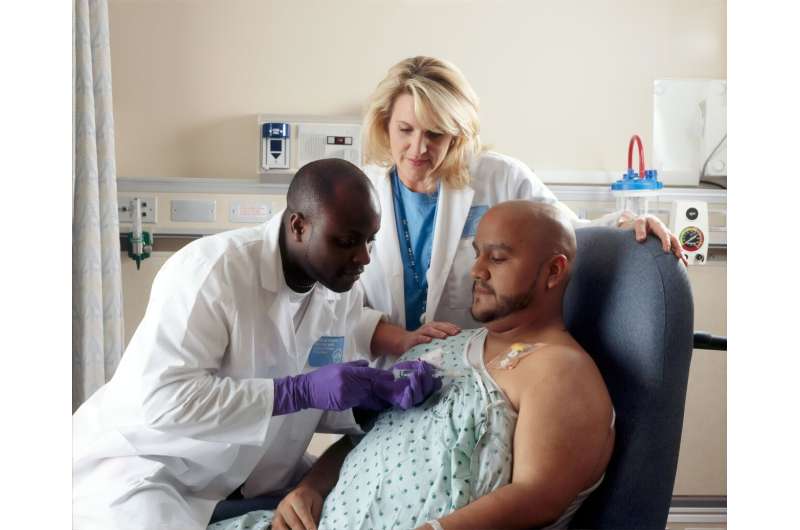Home » Health News »
Intervention reduces disparities in timing of lung cancer surgery between Black and white patients

A detailed analysis by researchers at UNC Lineberger Comprehensive Cancer Center and Greensboro Health Disparities Collaborative designed to address racial inequities in timing from diagnosis to surgery for lung cancer has found that a multi-faceted intervention resulted in timelier lung cancer surgery for Black patients.
The findings appeared Feb. 14, 2022, in the Journal of Clinical Oncology.
Reported in February 2019, the ACCURE trial (Accountability for Cancer Care through Undoing Racism and Equity) implemented interventions at cancer treatment centers that helped eliminate disparities in treatment for Black patients with early-stage lung and breast cancers. The interventions included a real-time notification system based on electronic health records showing missed clinical milestones; reporting race-specific treatment rates to clinical teams; and engaging a nurse navigator trained in racial equity to guide patients throughout their treatment.
“The ACCURE intervention came about because of community activism and engagement, primarily by the Greensboro Health Disparities Collaborative—a partnership with expertise in antiracism and community-based participatory research,” said corresponding author Marjory Charlot, MD, MPH, MSc, assistant professor in the UNC School of Medicine and assistant director of Community Outreach and Engagement and Patient Engaged Research at UNC Lineberger. “ACCURE investigators were able to analyze the roots of racial inequities in the community and develop this first-of-its-kind intervention to eliminate treatment and timely care gaps for early-stage lung cancer.”
Historically, Black patients are less likely to be treated with surgery for lung cancer than whites. If they do undergo surgery, Black patients are more likely to experience treatment delays; time from diagnosis to surgery averages 6.7 more days for Black patients than white patients. Each week of treatment delay results in a 3.2% drop in survival for early-stage lung cancer. In North Carolina alone about 8,760 people are expected to be diagnosed with lung cancer in 2022 and 4,750 are expected to die of the disease.
The current study, led by Charlot and colleagues, analyzed the benefits of the ACCURE intervention for patients with lung cancer by comparing three groups: Patients participating in the ACCURE trial from 2013-2016; a historical control group of patients treated for lung cancer from 2007-2012; and a concurrent control group of patients not in the trial who were diagnosed in 2014-2015 and subsequently had lung cancer surgery at two participating study sites. The primary factor the researchers looked at was completion of surgery within eight weeks of diagnosis.
The median time from diagnosis to surgery was 34 days in the historical group, 33 days in the concurrent group, and a markedly improved 23 days in the intervention group. When evaluated by race, the median time to surgery in the historical group was 43 days for Black patients vs. 32 days for white patients. In the intervention group the median time to surgery decreased to 28 days for Black patients and 21 days for white patients.
The study found that 87.1% of Black patients and 85.4% of white patients in the intervention group received surgery within eight weeks of diagnosis compared with 58.7% of Black patients and 75% of white patients in the historical group and 64.9% of Black patients and 73.2% of white patients in the concurrent group.
“Our findings demonstrate that racial inequities in care can and should be measured, and providers must be made aware of differential practices,” said Charlot. “Monitoring, feedback loops, racial equity training, and patient navigation—essentially an entire system change—appears to be necessary to not only improve treatment rates but also to result in timely care. Additionally, we need to look at multiple opportunities to improve lung cancer outcomes across the continuum—from prevention via smoking cessation, to screening among individuals at high risk for lung cancer, to biomarker testing, radiation, and systemic therapies for advanced disease.”
Source: Read Full Article



